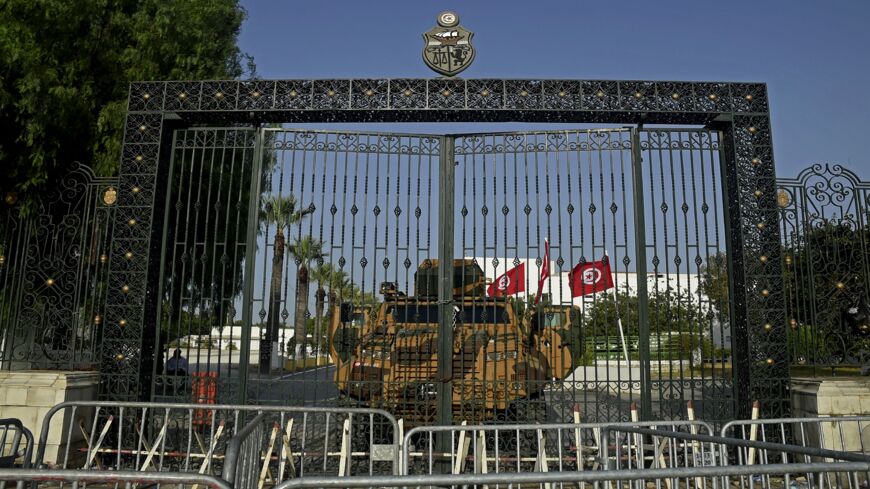TUNIS — In a statement to Mosaique FM on Aug. 27, Tunisia’s former Minister of Trade Mohsen Hassan called for the swift formation of a government. He stressed the need for the government to include skilled figures capable of extricating Tunisia from the unprecedented economic and social crisis it is going through due to the inefficiency of the economic policies pursued since the 1990s.
Speaking to Al-Monitor, Hassan said Tunisian President Kais Saied’s Aug. 23 decision to extend exceptional measures taken on July 25 and continue disrupting parliament’s work until further notice may deepen the economic actors’ concerns over the negative and catastrophic repercussions on the sovereign ratings of the Tunisian economy and the business and investment climate.
The exceptional measures adopted by Saied in July consisted of suspending parliament; lifting the immunity of its members; dismissing the prime minister, among other Cabinet officials; and assuming executive authority and tasks of the Public Prosecution office.
Reda el-Shakandali, director of the Center for Economic and Social Studies and Research, told Al-Monitor the current situation will have dire consequences for the future of the business climate in Tunisia if the president does not speed up the formation of a Cabinet capable of managing public affairs and entering into negotiations with international financial institutions.
Shakandali warned that the decline in investor confidence in the Tunisian market is an inevitable result of political instability.
He explained that Tunisia witnessed the succession of 11 governments after the 2011 Jasmine Revolution, including three governments since 2019; it is now without a parliament or government, and all powers are in the hands of the head of state.
Also, he said, a roadmap to end the crisis and a government have yet to be announced, which may slow down investments.
Negotiations between the Tunisian government and the International Monetary Fund (IMF) that began in mid-May with the aim to obtain a $4 billion loan stalled due to the ambiguity of the political and economic situation in Tunisia.
The IMF is requiring political stability as well as a commitment to implementing a set of overdue reforms such as reducing the fiscal deficit, reducing the wage bill, reducing energy subsidies, giving priority to spending on public health, investment, and protecting social spending directed to those who are eligible.
Fitch Ratings Agency said in a statement on Aug. 7 that in the face of the political situation in light of Saied’s moves, it is difficult to reach an agreement with the IMF.
The agency cautioned against downgrading Tunisia in the wake of the recent downgrade of its sovereign rating to “B-,” as this would infer a high risk of failure to settle dues.
Minister of Finance and Economy Ali al-Kali had announced before parliament on April 15 that Tunisia needed to borrow again, not with the aim of investing but of paying off its debts and disbursing pensions and retirement grants.
He stressed that the total value of the loans included in the 2021 budget were estimated at 18.4 billion dinars (about $6 billion) to finance the expected budget deficit and pay more debts due, as well as to pay the wages of employees in the public sector.
On Aug. 16, Saied announced he would wage a relentless war on corruption and the corrupt, as he issued travel bans for businessmen and parliament members suspected of corruption.
During the month of August, the Tunisian president made a number of surprise visits to cool stores and food storage facilities, as he called on businesspersons and prominent dealers in vital sectors to voluntarily reduce prices of goods and help Tunisians under such exceptional circumstances.
He threatened to resort to “the most severe penalties on monopolists and speculators.”
Meanwhile, government services raided warehouses belonging to people they described as practicing speculation in iron as well.
Abid Briki, a former minister of public service and governance, told Al-Monitor, “Tunisia without a government and without a parliament cannot solve its economic and political crisis let alone negotiate with donors and international institutions to obtain loans.”
He said the political struggle over power has deepened the country’s economic crisis.
Writer and political analyst Mohammed al-Thweib told Al-Monitor the Tunisian youth chose Saied in the last presidential elections instead of many competitors because Saied has clean hands.
He said the crisis Tunisia experienced after the 2011 revolution was mainly driven by the Islamist Ennahda movement that failed to govern the country amid increasing poverty and unemployment rates.
According to the latest government statistics at Statistiques Tunisie, the unemployment rate reached 17.9% during the second quarter of this year, compared to 17.8% during the first quarter. The number of unemployed people until the end of March reached 742,800 compared to 725,100 in the fourth quarter of 2020, while the trade deficit in Tunisia amounted to about $3.1 billion in the first seven months of 2021 compared to about $2.6 billion year over year.
Tunisia, which in 2020 witnessed a rise in its debt burden — an economic contraction of 8.8% and a fiscal deficit of 11.4% — started talks with the IMF to obtain a loan of $4 billion over three years in a bid to help stabilize the balance of payments after the current account deficit widened to 7.1% of the gross domestic product last year.






